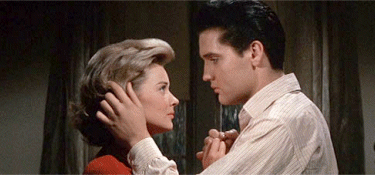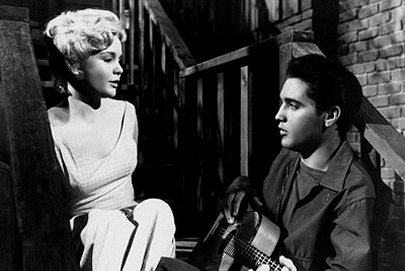Sixties
City presents
a wide-ranging series of
articles on all aspects of the Sixties, penned by the creator of the iconic
60s music paper Mersey
Beat
|
Sixties
City presents
a wide-ranging series of
articles on all aspects of the Sixties, penned by the creator of the iconic
60s music paper Mersey
Beat
|
|||||
|
 |
Elvis'
seventh film was a 20th Century Fox movie, released in 1961. It was directed
by Philip Dunne, produced by Jerry Wald and was 114 minutes in length. Elvis
portrays a backwoods delinquent, Glen Tyler, on probation for a murder he
was wrongly accused of. His mother is dead; his father doesn't want to be
involved with him and he is placed in the hands of his Uncle Rolfe (William
Mims). Rolfe's daughter, Glen's cousin, Noreen (Tuesday Weld) also lives
with them. She has a baby born out of wedlock to a New York salesman and
Rolfe tries to encourage a romance between them, hoping that Glen will agree
to marry her. In the meantime, the youth is encouraged in his talent for
writing short stories by his therapist, the psychologist Mrs Irene Sperry
(Hope Lange). He begins to form a romantic attachment to the older woman
as she seeks to help him to gain a graduate writing course. He also finds he is attracted to Noreen while still paying attention to his girlfriend, the sweet Betty Lee Parsons (Millie Perkins). Glen is able to pour his heart out about how he feels about the loss of his mother to Mrs Sperry, who becomes something of a mother figure, although a genuine romance looms, which results in her nearly committing suicide. Originally, the older woman was to be played by Simone Signoret but playwright Clifford Odets, who scripted the movie, was fired two weeks before shooting began. Fabian had also been considered for the role of Tyler. The script was based on 'The Lost Country', the first novel by J.R. Salamanca. Odets had delivered a 300 page script which was far too lengthy for the studio's liking. Fox refused to pay Odets any further money so director Dunne then had to write the script himself. Signoret was replaced by Lange. She was the 'older woman' - a type featured in several Elvis movies, although Lange was actually only a year older than Elvis. |
| Two endings
had been filmed, one in which Mrs Sperry commits suicide and another in
which she doesn't. At the previews, audiences didn't like the fact that
the older woman committed suicide, so the alternative ending was used. In
one scene Millie Perkins slaps Elvis, but she broke her wrist doing so!
It was originally a very dramatic film, with Elvis' role portraying lots
of angst, with something of a James Dean style character. However, the studio
wasn't too happy with it being a full drama and decided to introduce some
songs into it. Some numbers were hurriedly prepared and recorded, although
not all of them were used in the movie. Elvis recorded the numbers at the
Radio Recorders Studio in Hollywood in November 1960 with himself on vocals,
Scotty Moore and Tiny Timbrell on guitars, Myer Rubin on bass, Bernie Mattinson
on drums, Dudley Brookes on piano and The Jordanaires on vocals. The title
song 'Wild In The Country' was penned by Huge Peretti, Luigi Creatore and
George Weiss. It was sung over the film's credits and issued as a single
in 1961 with 'I Feel So Bad' on the flip. Another song in the film was 'I Slipped, I Stumbled, I Fell', which Elvis sings to Millie Perkins while driving a pick-up truck. It was written by Fred Wise and Ben Weisman and is to be found on the albums 'Something For Everybody' and 'Separate Ways' in addition to the CD of 'Flaming Star'/'Follow That Dream'/'Wild In the Country', released in 1993. 'In My Way' was a number which Elvis sang on the back steps of his character's Uncle's store to Tuesday Weld. It was penned by Fred Wise and Ben Weisman and is included on the albums 'Elvis For Everyone' and 'Separate Ways.' The other songs recorded by Elvis for the film but not used were 'Lonely Man' and 'Forget Me Never.' 'Lonely Man' was originally considered as the title for the film, but was dropped when the song was cut from the final print. The title 'Wild In the Country' comes from poet Walt Whitman's 'Leaves of Grass' and was a title producer Jerry Wald had wanted to used for several years. Elvis had recorded two versions of the number on 7th November 1960, one for a record release. The number was issued as the flipside of 'Surrender' in February 1961. 'Forget Me Never' was penned by Fred Wise and Ben Weisman and, although not used in the final print, it was included on the albums 'Elvis for Everyone' and 'Separate Ways.' He also recorded a duet with Hope Lange, 'Husky Dusky Day' which was included in the film and is to be found on bootleg albums such as 'Eternal Elvis' and 'From Hollywood to Vegas.' 'Wild In The Country' was premiered in Memphis on 15th June and opened nationally the following week on a bill with 'The Right Approach' which featured Liverpool singer Frankie Vaughan and Juliet Prowse, Elvis' co-star in G.I. Blues. |
 |
|
Article
Text
UK
web hosting by
|